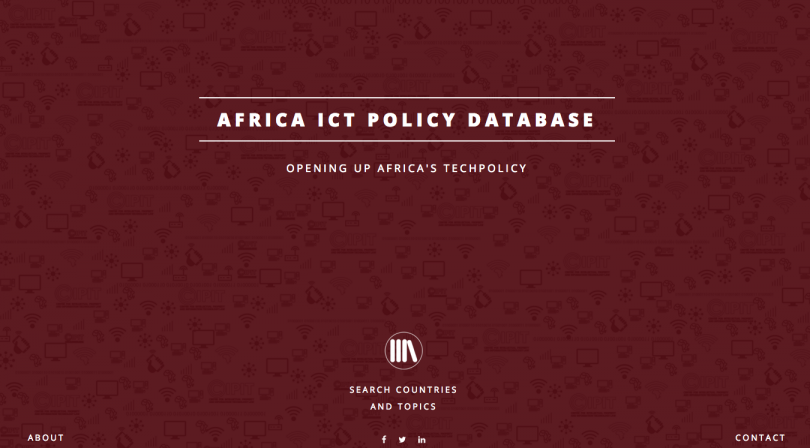There’s a new home on the Web for laws and policies related to ICT in all 54 African countries. The Africa ICT Policy Database is an open and free resource for anyone working on information technology and intellectual property research or advocacy. It contains official documents including constitutions, conventions, acts and regulations and calls for regional collaboration and citizen participation to keep it up to date.
“This is a very ambitious undertaking and will involve extensive partnerships with governments, civil society and libraries,” say the creators of the database. It is a project of The Centre for Intellectual Property and Information Technology Law (CIPIT) based at The Strathmore Law School in Kenya, and includes a tool to aggregate comments on bills and proposed regulations called Jadili.
Using the new platform, a sponsor can upload a bill, set a timeframe for public comments and document annotations. Once complete, a report is sent to the bill sponsor and all those who participated with comments.
The Africa ICT Policy Database was unveiled today at an event Strathmore University in Nairobi, and is introduced as an opportunity to begin to experiment with more open policy processes in Africa.
Interview with Moses Karanja
Moses Karanja (@Mose_Karanja) runs the Africa ICT Policy Database, and is responsible for coordinating all partnerships. He is also a member of our #FASTAfrica planning group which is helping to steer activities for an action week May 1-7, 2016 on Internet rights across the continent.
Q: Does ICT policy really matter? Governments can say so many nice things in writing, but what guarantee is there that they will ever follow through?
It REALLY Matters. If you look at all countries that enjoy relatively favourable Internet connections in the developing world, they all share one trait: a deliberate government policy to connect the country, from Ghana, Rwanda, Kenya, South Africa to Seychelles.
If you turn the argument around, countries performing dismally (I’m looking at Ivory Coast, Burundi, Ethiopia, Zimbabwe, and Madagascar – all neighbours to the previously mentioned countries respectively) they had either no dedicated policies in the last five years or mainly use their policies to limit connectivity for political reasons, especially information control.
Policy sets up a framework for the long term. There may be easier things to focus on, but as long as ICT policy is non-existent or inward-looking, it will always be a catch up game.
Following through on policy can only take place if you have good policy in the first place! That is why public participation is so important. As more people go online, I believe they will be interested in helping to shape the decisions that affect them. We need more tools like the Africa ICT Policy Database to make participation a reality. This may, just may, ensure follow through.
Q: Why not just focus on one country? What’s the point of having the entire continent’s laws, acts, etc. in one place?
Because this is what we have currently – government websites and departments that these keep these policies and laws in different places. What you then ultimately have are disconnected folders, which makes it more difficult for researchers or interested parties to get into them.
A common database helps ease the work of tracing and access, and offers comparative advantage in knowing what other countries have decided on particular topics. Working together, countries can collaboratively create one library that serves all of us, inexpensively.
Q: Have you seen policy databases like this in other regions?
SMEX have being doing something similar in Middle East (https://smex.silk.co/) and WIPO has something (http://www.wipo.int/wipolex/en/) for IP laws. I am sure there could be others.




Stay inatvmfoire, San Diego, yeah boy!
I went on Hotwire and reserved a room for $40 ($50 with taxes). The hotel I got was Baymont Inn & Suites Grand Rapids North which is fairly close to the festival.
it should be soon and that the owners were waiting for permission to change the signs. They had been told it would be open in three weeks, two weeks ago. We’ll see.
You are so kind with your thoughts and comments. I had so much fun writing all these months, but sadly the story had to end this way. Some books have sad endings, but don’t end without hope. After your stressful meetings… deep breathing, perhaps? Or a nice cup of tea?Hugs Ann… It’s been great getting to know you! ; )
Merci Vincent !!J’ai vu, j’ai cliqué « j’aime » … Du coup j’ai pu retrouner voir votre blog, oups, tellement de choses à voir !! Mais je vous suis également sur facebook !!
Join the illuminati to be rich and famous WhatsApp or call +2348137089925 don’t fail to see the light
It’s impressive how the Dino Game has become such an iconic part of Chrome’s offline experience! https://dino-game-f7505a.webflow.io/
The promise of real money earnings through In999 games is undoubtedly one of its strongest appeals, attracting a significant user base looking for both entertainment and financial opportunity. This feature, combined with secure and prompt payment gateways, establishes a high level of user confidence and loyalty.